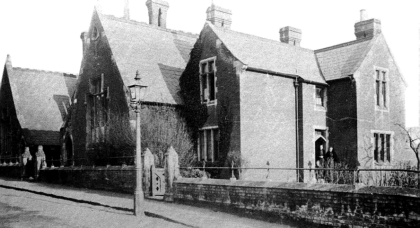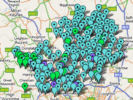The Council at War
Chapter 9
The Troops Arrive
Schools are Commandeered.
Walter Locke was at the forefront of the changes. He was unable to attend the Council meeting on 12th August because of the discussions he was having with the military authorities about the water supplies and other matters. The following week The Gazette reported that “The officers in Hemel Hempstead are warm in their praise of the manner in which their demands are being met by the local authorities. The Borough Surveyor (Mr W. R. Locke) and the Sanitary Inspector (Mr S. S. Rawson) are experiencing an extremely busy time.”
 |
|
The George Street School was taken over but returned in time for the new term |
The full extent of Walter’s extra duties at this time are unclear but on August 22nd he gave a detailed report to the Council’s Education Committee on attempts he and Mr Smeathman had made to find suitable accommodation. Every school in the district, apart from the one in Bury Road1, had already been taken over. Even this school had been inspected by an officer who had described it as “a very nice school, just painted up, which we propose to take”. When it was pointed out that it was the only school left, he said that the Army would try to use only one room, and by the afternoon they had built their kitchen in the playground. When Walter and Lovel Smeathman got to Messrs Kent’s factory to ask if there was a room for the Apsley school children they found that the 8th Brigade had been there first, and the same thing had happened at Dickinson’s and at the Parish Rooms. Mr Craft suggested they might be able to use a dining room in the Kent works, but this was not really suitable, and there were difficulties with using the Wesleyan Chapel or the chapel in Featherbed Lane. At the Two Waters School they had been able to persuade the Army to confine their activities to the new building, leaving the old building for school use. The possibility of putting the infants in the Wesleyan School, and the seniors in the Baptist Chapel in London Road was also considered. In looking for an alternative to St John’s School, they examined the church and Mr Robin’s old factory at Hammerfield and the Working Men’s Club in Cotterells. It was hoped to relocate the George Street School in the rooms at the Baptist Church in Marlowes. The infants room in the Queen Street School was being used as an office, despite the fact that there was an empty new house opposite. Walter Locke told the Education Committee that he would rather give up a room in his own house than have children locked out of their school. Mr Percy Christopherson suggested that the Bury Road infants could be accommodated in the rooms at the Congregational Church in Christchurch Road.
 |
|
The Congregational Church on the corner of Alexandra Road and Christchurch Road. Piccott’s End School was moved to the Sunday School Rooms |
|
It was quite clear that when the term restarted at the beginning of September there would be considerable disruption of the teaching programmes, and expense would be incurred in moving the desks, etc., to the temporary accommodation. The Committee agreed that a delegation consisting of Alderman Dunbar, Mr Lovel Smeathman and Mr W. R. Locke should approach the War Office and the Board of Education. In fact this proved unnecessary as arrangements were made for the Army to move out of some of the schools, and on August 29th the Gazette published the arrangements for the start of term. Samuel Rawson was in charge of monitoring the billeting arrangements which would have involved over 2,000 men. A large number of households agreed to take one or more of the ‘khaki boys’. For each soldier billeted there was a payment of 6d a night for the bed, 5d for breakfast, 1s 1d for dinner and 3d for supper. Billeting was an attractive proposition for many of the townsfolk, although in many cases soldiers fed in the Army mess, rather than in their billet. Those who did not want to take soldiers into their home were given little option. There were almost certainly incidents such as one reported in St Albans where a lady informed the billeting office “that the only accommodation she had was the door mat. ‘Very well, we’ll book two for that’ was the order.” The 17th Battery moved into the Manse, Alexandra Road, and in September Lieutenant C. E. H. Lloyd appealed for bedsteads. At the end of the month changes were made to get all horses under cover at night. As a result some of the troops in the town moved to Water End and Great Gaddesden, while some Boxmoor units moved to Bovingdon, and Ashlyns, Berkhamsted. The problems were complicated because a number of the soldiers’ wives came from London to be near their husbands, and the first wave of Belgium refugees (40 Roman Catholic Sisters from Marlines) arrived at Boxmoor on 15th October. Finding suitable accommodation was not the only problem. At Mr Locke’s suggestion the Waterworks Committee “agreed to the fitting up of several of the disused washing baths at the Waterworks for the benefit of the troops.” The perennial issue of whether the Town should have public conveniences also reappeared on the agenda. The large increase in population would have resulted in further work as at Luton where “Special attention is being given to the sanitary condition at the places where the men are billeted. The troops have their own staff for the purpose, and they are working in close conjunction with the Corporation’s sanitary staff. The Corporation are clearing refuse daily.” At the same time the Minutes of Hemel Hempstead Rural District Council showed that Thomas Lighbody had to make special sanitary arrangements at Shendish and elsewhere. |
|
|
| August 2014 | Page Created |

